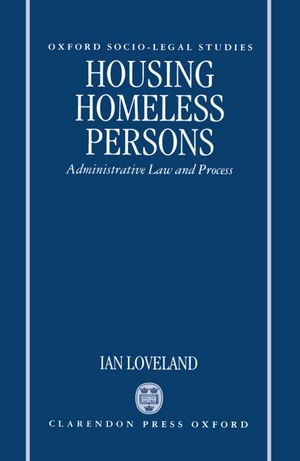
The size of Britain's homeless population has risen considerably since the introduction of the Housing (Homeless) Persons Act 1977. Recently, the Government announced plans radically to reform the existing legislation, a recognition of the political sensitivity of homelessness and the need for a coherent policy to tackle the problem.;Housing for the homeless is an issue which embraces housing, family and social security policy; it has also generated considerable interest for public lawyers, as the scope of discretionary powers provided by the Act has provoked a great deal of litigation in the High Court.;This study presents detailed empirical information on the manner in which three local authorities implemented the homelessness legislation. It focuses in particular on the processes of administrative decision-making at the lowest level, and reveals that the law plays a very limited role in shaping administrative policy decisions. Placing law within a context of administrative action, the author illustrates how administrative law must be understood by reference to the complex institutional structures with which it is daily involved.